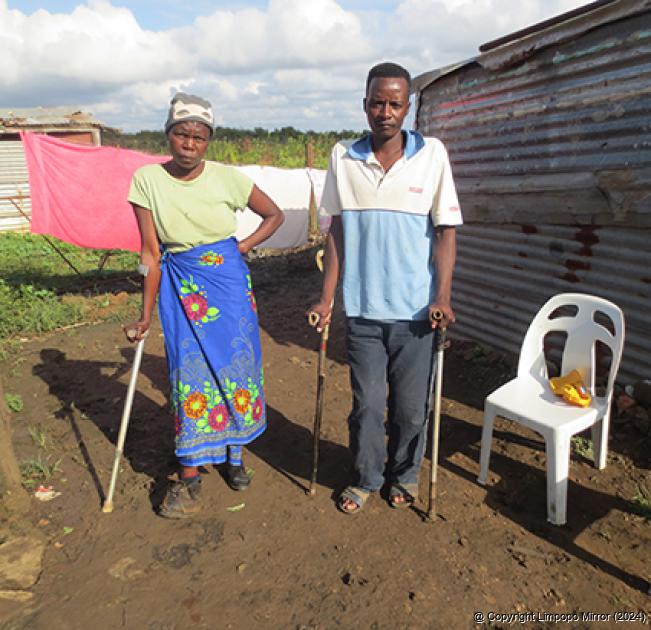

ADVERTISEMENT:

The two Sibandas. On the left is Tiyiwe and on the right is Mqabungo.
Lockdown has caused us misery, says Zimbabwean refugees
“Where to? What is next? The world seems (to be) coming to an end. Lockdown, though a good idea, has made our lives so difficult,” says Mqabungo and Tiyiwe Sibanda.
The lockdown period has taken them down memory lane to Nkai, a town near Bulawayo, a place they used to call home. After their parents passed away, they decided to come to South Africa. Both use crutches to help them walk from one point to the other.
The two Sibandas are among several hundreds of Zimbabweans staying in Tshikota who have been severely affected by the lockdown. Most of them live off casual jobs offered by farmers around Louis Trichardt, others make a living out of collecting recyclable material.
Lockdown regulations do not allow unnecessary movement of any persons. Following the announcement of the lockdown, the Department of Home Affairs outlined temporary measures to address immigration matters during the lockdown. Among the temporary measures is, the one that reads “except for cases relating to expatriation initiated by another state, all foreign nationals who are currently in South Africa may not depart”.
On the other hand, the Department of Social Development is handing out food parcels to vulnerable people who are South African citizens, permanent residents, or refugees.
This has left the foreigners in a dire situation.
“I came to South Africa in 2008 to look for employment. Unfortunately, I could not find any, so I decided to pick up empty beer and cool-drink cans for resale. I have to crutch all the way from Tshikota to town to pick up these empty cans,” said Tiyiwe (45), now a mother of three.
She gets little money from these empty cans. On average, she pockets about R300 per month which she uses for paying rent and buying food. She stays in a shack. Her rent is R350 per month.
“It is fortunate that my landlord understands our situation. We make payment plans,” said Tiyiwe.
Because her brother, Mqabugo, is also disabled and no one could look after him, Tiyiwe advised her brother to join her this year. Mqabugo also uses crutches and survives by begging. He usually visits the Eltivillas area, begging for food and clothes.
“Since the lockdown, I have no idea of where to get food the next day. I can no longer move around to my usual places to beg for food,” said Mqabugo (40).
Another Zimbabwean, Svodai Moyo, a mother of three who usually lives off casual jobs on farms around Louis Trichardt, also finds it difficult during the lockdown. Moyo said the lockdown had hit her hard. She prepares very little food just to keep herself and the children alive. At times she forgoes other meals. The children are aged 11, 6 and 3.
Meanwhile, Vumbanani for Peacebuilding, an NGO, has been receiving requests for help during the lockdown period from these Zimbabweans living in Tshikota. The NGO is appealing to the government, well-wishers, business community, farmers, and community members for support of the affected group.
Date:05 May 2020
By: Bernard Chiguvare
Bernard Chiguvare is a Zimbabwean-born journalist. He writes mainly for the online publication, Groundup.
Read: 1295

ADVERTISEMENT

ADVERTISEMENT:

ADVERTISEMENT:

Recent Articles
-

Bloodshed continues in ongoing gang war
26 April 2024 By Victor Mukwevho -

Yahya selected for SA over-50s World Cup
26 April 2024 By Anton van Zyl -

'Pervert case' back in court
25 April 2024 By Victor Mukwevho -

Drivers of delivery trucks fear more hijackings
25 April 2024 By Elmon Tshikhudo -

'Rambo' Tshivhase hailed as a brave, intelligent leader
25 April 2024 By Victor Mukwevho

ADVERTISEMENT

Popular Articles
-

Leopards’ top striker dreams of playing for Kaizer Chiefs
22 March 2024 By Frank Mavhungu -

Well-known inventor, Prof Mulalo Doyoyo, dies
14 March 2024 By Victor Mukwevho -

Lesley Manyathela stadium remains a 'white elephant' to local clubs
23 March 2024 By Kaizer Nengovhela -

Prophet Muritho's nightmare continues
19 April 2024 By Elmon Tshikhudo -

Park development leaves residents puzzled
22 March 2024 By Andries van Zyl -

Many questions as man shoot himself in the head
15 March 2024 By Elmon Tshikhudo -

Choir leader shot twice during Easter service
05 April 2024 By Victor Mukwevho

